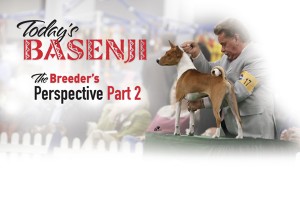Today’s Basenji – The Breeder’s Perspective Part 2
Click here to read the complete article
 By Amy Fernandez
By Amy Fernandez
When AKC closes a breed’s studbook upon recognition, the act is both literal and symbolic. It means that from that point forward only purebred, documented individuals can officially claim recognition. Yes, reciprocal registration agreements permit inclusion of stock from other registries as long as those dogs share the same cultural purebred definition. On a higher level, a closed studbook guarantees the genetic integrity of each registered individual. There is no gray area in this designation. Dogs are either in or out. And the system generally works like a charm, so much so that after more than a century we sometimes take that predictability and quality for granted.
However, once in a while there’s a problem. For instance, today it’s commonplace and best practice to identify and document genetic health disorders. That doesn’t imply that fixing the problem is always easy. Minimizing the expression of undesirable genes is predicated on the existence of unaffected stock. Sometimes that ain’t so easy to find.
Probably the most famous workaround out of that tight corner was the controversial Dalmatian/Pointer crossbreeding experiment originally undertaken in the early 1970s. It was a radical step to address the metabolic defect known as hyperuricosuria, which had become quite prevalent in Dalmatians but remained extremely rare in other breeds. The genetic transmission of the defect was due to a simple recessive. Unfortunately, a very large proportion of the registered population carried it. Breeding away from it became very difficult.
Click here to read the complete article

Short URL: https://caninechronicle.com/?p=206573
Comments are closed











